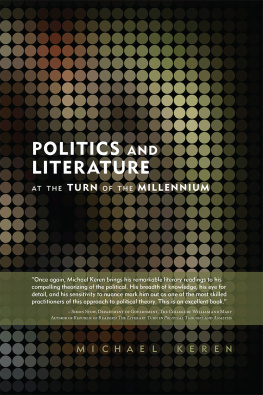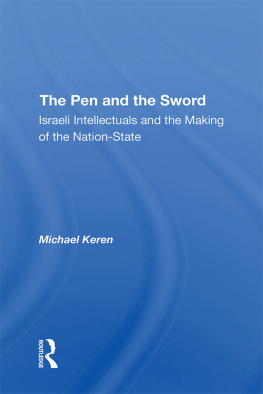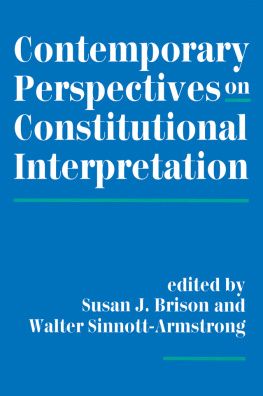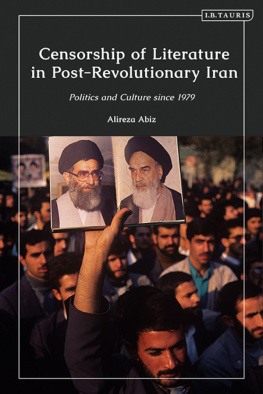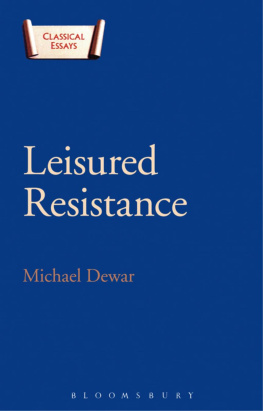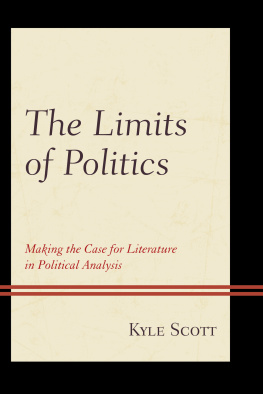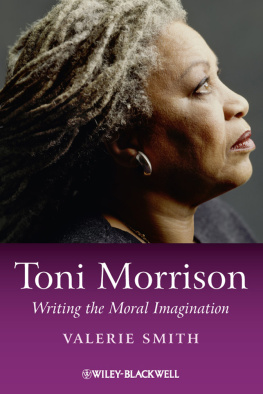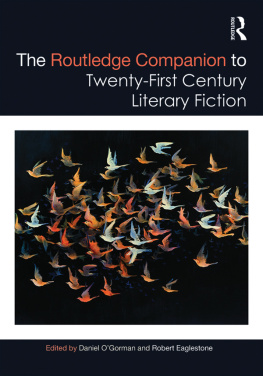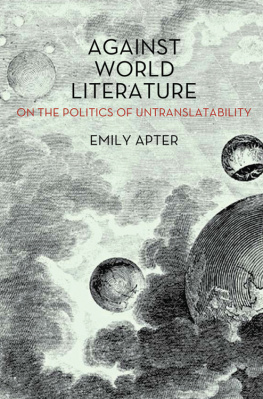2015 Michael Keren
University of Calgary Press
2500 University Drive NW
Calgary, Alberta
Canada T2N 1N4
www.uofcpress.com
This book is available as an ebook. The publisher should be contacted for any use which falls outside the terms of that licence.
Library and Archives Canada Cataloguing in Publication
Keren, Michael, author
Politics and literature at the turn of the millennium
/ Michael Keren.
Includes bibliographical references and index.
Issued in print and electronic formats.
ISBN 978-1-55238-799-3 (paperback).ISBN 978-1-55238-801-3 (pdf).
ISBN 978-1-55238-802-0 (epub).ISBN 978-1-55238-803-7 (mobi)
1. Fiction21st centuryHistory and criticism. 2. Politics
in literature. 3. Politics and literature. 4. AuthorsPolitical and
social views. I. Title.
PN51.K47 2015 809.93358 C2015-903014-5
C2015-903015-3
The University of Calgary Press acknowledges the support of the Government of Alberta through the Alberta Media Fund for our publications. We acknowledge the financial support of the Government of Canada through the Canada Book Fund for our publishing activities. We acknowledge the financial support of the Canada Council for the Arts for our publishing program.
Cover images: # 2505055 (colourbox.com)
Cover design, page design, and typesetting by Melina Cusano
E-book conversion by Human Powered Design



Acknowledgments
This study was conducted at the University of Calgary, where I was granted a Canada Research Chair in the departments of Political Science and Communication, Media and Film. I am grateful to the CRC Program and to my colleagues at the university for their support and inspiration over the years, especially Maria Bakardjieva, David Bercuson, Barry Cooper, Roger Gibbins, Richard Hawkins, Rob Huebert, Karim-Aly Kassam, Rainer Knopff, David Mitchell, Ted Morton, Pablo Policzer, Stephen Randall, Kathleen Scherf, and David Taras. I greatly benefited from my conversations on various aspects of this study with Cassandra Atherton of Deakin University, Glenda Abramson of the University of Oxford, Yvon Grenier of St. Francis Xavier University, Michael Kochin of Tel-Aviv University, Neil Mclaughlin of McMaster University, and all participants in the annual Harvard conferences on public intellectuals. I received much inspiration from my graduate students, especially Julia Brotea, Naor Cohen, Janis Goldie, and Gillian Steward. I am indebted to my research assistants Andrea Matishak, Cassandra Dam, and Nycole Wetmore for their effective and conscientious help on this book.
Politics and Literature at the Turn of the Millennium is a sequel to my 2003 book The Citizens Voice: Politics and Literature in the 20th Century , also published by the University of Calgary Press. I would like to thank the wonderful staff at the U of C Press, including director Brian Scrivener, former interim director John Wright, designer Melina Cusano, operations manager Michelle Lipp, editorial secretary Karen Buttner, and editors John King and Peter Enman.
Finally, I acknowledge the publishers who gave me permission to include in this book the following material:
Michael Keren, The Original Position in Jos Saramagos Blindness, Review of Politics 69, no. 3 (Summer 2007): 44763. Copyright 2007 University of Notre Dame. Reprinted with the permission of Cambridge University Press.
Michael Keren, Absurdity and Revolt in Cormac McCarthys The Road, Phaenex: Journal of Existential and Phenomenological Theory and Culture 7 (Spring/Summer 2012): 22143. ISSN: 1911-1576.
Michael Keren, The Bystanders Tale: Gil Courtemanches A Sunday at the Pool in Kigali and the Rwandan Genocide, Studies in Canadian Literature 34, no. 2 (2010): 2239.
Michael Keren, Fiction and the Study of Slums: Anosh Iranis The Cripple and His Talismans, Journal of Poverty 12, no. 2 (2008): 25161, reprinted by permission of Taylor & Francis (http://www.tandfonline.com).
Michael Keren, Shared Narratives and the Politics of Memory: Toward Reconciliation, in Life and Narrative: The Risks and Responsibilities of Storying Experience , ed. Brian Schiff, Sylvie Patron, and Elizabeth McKim (Oxford University Press, 2015 [in press]).
Michael Keren, The Quest for Identity in Sayed Kashuas Let It Be Morning, Israel Studies 19, no. 1 (Spring 2014): 12644. Indiana University Press.
Michael Keren, Political Escapism in Contemporary Israel: Lessons from David Grossmans To the End of the Land. Journal of Modern Jewish Studies 14 no. 2 (2015): 24660, reprinted by permission of Taylor & Francis (http://www.tandfonline.com).
Michael Keren, A Canadian Alternative to the Clash of Civilizations. International Journal of Canadian Studies 37 (2008): 4155. Copyright 2008 International Council for Canadian Studies, DOI: 10.7202/040794ar, reprinted with permission from University of Toronto Press (www.utpjournals.com).
CHAPTER 1
Politics and Literature
As a graduate student in the United States in the 1970s, I was exposed to the power of the social sciences. The search for solid social theories, the emphasis on rigorous methodology for empirical research, and political activism on campus and beyond, combined to create a fascinating learning environment. Systems theory, structural functionalism, modernization theory, computer simulations, social indicators, cost-benefit analysis, quantitative content analysis, simulations, stochastic models, and other conceptual and methodological devices were part of a new intellectual endeavour conducted for a good cause: to help the campaign against hunger, poverty, disease, crime, discrimination, and other social ills. Following the Great Society initiative, social programs were designed, replacing the grand ideologies of the inter-war era with piecemeal social engineering. Social scientists devoted to progress based on empirical research rather than on mobilization of the masses were seen as an asset for government. And although the alignment of politics and the professors was not expected to be easy, the massive recruitment of university graduates by the Kennedy and Johnson administrations, and the introduction of academic methods such as operations research, game theory, and PPBS (Planning, Programming, and Budgeting System) into major government departments, signalled the victory of sociology over ideology.
In 1960 Daniel Bell declared that among Western intellectuals the old passions were spent. The title of his volume of essays The End of Ideology became a landmark for a generation of baby boomers arriving on Western campuses in the mid-1960s who could easily identify with the claim that the new generation, with no meaningful memory of... old debates, and no secure tradition to build upon, finds itself seeking new purposes within a framework of political society that has rejected, intellectually speaking, the old apocalyptic and chiliastic visions. Much of that passion was devoted in those years to political protest against the Vietnam War, but fused with the new theories and methods of the social sciences it also inspired social research and action on the limits to growth, environmental protection, the population explosion, urban decay, the welfare state, women rights, global inequality, and other issues.

